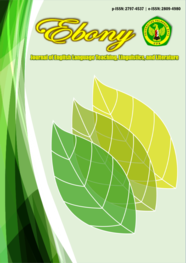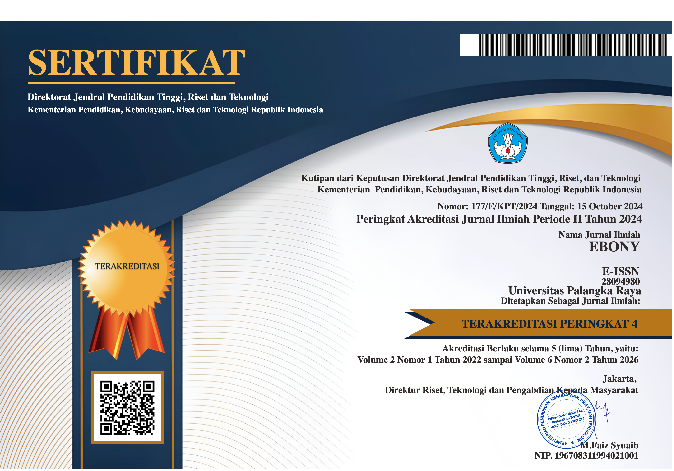Assessing 4C Competencies in English Language Learners: Tools, Challenges, and Implications
DOI:
https://doi.org/10.37304/ebony.v4i2.14147Keywords:
4C competencies, assessment tools, English language learners, teacher trainingAbstract
In the era of globalization and the Fourth Industrial Revolution, 21st-century skills—Critical Thinking, Communication, Collaboration, and Creativity (4C)—are essential for learners' success in dynamic and competitive environments. This study evaluated 4C competencies in English language learners, focusing on comprehensive assessment tools, challenges, and implications. The literature review method was used to analyze various peer-reviewed sources, highlighting effective tools such as rubrics, performance-based assessments, and technology-enhanced platforms. Challenges include the subjective nature of evaluating creativity and the necessity for extensive teacher training. The study emphasized the need for integrating 4C skills into English language curricula to create dynamic learning environments that enhance both language proficiency and essential life skills. The findings suggested that adopting innovative assessment strategies and providing ongoing professional development for educators are crucial. Ultimately, assessing and cultivating 4C competencies will contribute to developing adaptable, innovative, and effective communicators, preparing students for the complexities of the 21st century. Continuous research and investment in this area are vital for advancing English language teaching and learning.Downloads
References
Alam, F., & Labadan, N. J. (2022). Enhancing communication skills among students: A systematic literature review. International Journal of Instruction, 15(2), 535–554.
Alam, R., & Labadan, D. (2022). Communicative language teaching: Enhancing communication skills through interactive methods. Journal of Language and Education, 9(2), 102–114.
Alqahtani, M. (2021a). Assessing 21st-century skills in English language learners. TESOL Journal, 12(4), 145–158.
Alqahtani, M. (2021b). Challenges in assessing 21st-century skills in English language learners. Educational Research International.
Asghar, A., Saidin, K., & Sulaiman, T. (2022). Assessing 4C skills in English language learners using rubrics and portfolios. RELC Journal, 53(1), 27–41.
Braun, V., & Clarke, V. (2006). Using thematic analysis in psychology. Qualitative Research in Psychology, 3(2), 77–101.
Chen, L., Tseng, H., & Huang, Y. (2023). Technology-enhanced assessment of 4C competencies in higher education. Journal of Educational Technology.
Chen, Y. L., Lin, Y. C., & Wang, C. C. (2023). Fostering communication and collaboration skills through online discussions: A case study in higher education. Computers & Education, 195, 104687.
Chu, S. K. W., Kwan, A. C. M., & Cai, J. (2023). Developing critical thinking skills among university students: A systematic review of intervention studies. Thinking Skills and Creativity, 38, 100905.
Chu, S., Reynolds, R., Tavares, N., & Notari, M. (2023). Problem-based learning in language education: Fostering critical thinking. Language Learning Journal, 5(2), 24–32.
Cronin, P., Ryan, F., & Coughlan, M. (2008). Undertaking a literature review: A step-by-step approach. British Journal of Nursing, 17(1), 38–43.
Hung, S. T. A., Samuelson, B. L., & Hung, Y. J. (2022). Using digital storytelling to foster creativity in English language learning. Language Teaching Research, 26(5), 708–729.
Kumar, P., Sharma, V., & Leckie, C. (2021). Developing collaboration skills among students: A systematic review of intervention studies. Journal of Applied Research in Higher Education, 13(4), 1025–1041.
Kumar, S., Rodrigues, C., & Yan, L. (2021). Collaborative learning strategies in ESL classrooms: Impact on language and teamwork skills. TESOL Quarterly, 23(4), 342–356.
Lee, J. C., & Carpenter, V. M. (2023). Fostering creativity in educational settings: A meta-analytic review of intervention studies. Review of Educational Research, 93(2), 268–301.
Lee, W., & Carpenter, S. (2023). Creative writing and digital storytelling: Enhancing creativity in language learners. Innovations in Language Learning and Teaching.
Machi, L. A., & McEvoy, B. T. (2016). The literature review: Six steps to success (3rd ed.). Corwin Press.
Malik, R. S. (2018). Educational challenges in 21st century and sustainable development. Journal of Sustainable Development Education and Research, 2(1), 9–20.
Namaziandost, E., Hosseini, E., & Utomo, D. W. (2021). The impact of cooperative learning on improving EFL learners’ language proficiency and collaboration skills. Journal of English Language Teaching and Learning, 13(28), 35–54.
Naidu, V., Menon, S., & Sari, R. (2022). Teachers' perspectives on assessing 21st-century skills: Challenges and strategies. Journal of Education and Learning, 16(2), 220-229. https://doi.org/10.11591/edulearn.v16i2.20220
Park, J., & Kim, Y. (2021). The effects of collaborative learning on enhancing communication skills among college students. Education Sciences, 11(6), 291.
Tseng, H., & Huang, R. (2023). Assessing 4C competencies in English language learners through performance-based tasks. Language Assessment Quarterly, 20(2), 125–141.
Yen, C. H., & Kuan, H. Y. (2022). Development and validation of a rubric for assessing critical thinking in project-based learning. Journal of Educational Computing Research, 60(6), 1299–1328.
Zare, M., Ganji, M., & Sayar, S. (2022). The effect of problem-based learning on EFL learners’ critical thinking and language proficiency. Language Teaching Research, 26(4), 596–615.
Zulfikar, R., & Mujiburrahman. (2022). Evaluating 4C competencies: Tools and challenges in English language assessment. Assessment in Education.
Zulfikar, T., & Mujiburrahman, M. (2022). Challenges in assessing 4C competencies in English language assessment. Indonesian Journal of Applied Linguistics, 12(1), 131–142.
Downloads
Published
How to Cite
Issue
Section
License
Copyright (c) 2024 Yanti Anggraini, Setiawati, Ika Purnama Sari

This work is licensed under a Creative Commons Attribution 4.0 International License.











